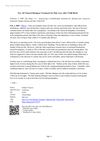3 citations,
October 2021 in “Indian Journal of Plastic Surgery” Pattern hair loss is mainly caused by genetics and hormones, with limited effective treatments available.
 1 citations,
February 2023 in “Digestive diseases and sciences”
1 citations,
February 2023 in “Digestive diseases and sciences” Gastroparesis may cause hair loss due to micronutrient deficiencies, and multivitamins might help.
[object Object] 1 citations,
July 2006 in “American Journal of Psychiatry” Lamotrigine can cause hair loss.
 December 2023 in “Advances in economics, management and political sciences”
December 2023 in “Advances in economics, management and political sciences” Consumers prefer general hair care products over those specifically for hair loss.
 December 2023 in “International Journal of Biomedicine”
December 2023 in “International Journal of Biomedicine” Topical finasteride might help with male hair loss with fewer side effects than pills, but more research is needed.
 January 2015 in “Springer eBooks”
January 2015 in “Springer eBooks” Fat-derived stem cells and their secretions show promise for treating skin aging and hair loss.

The new all-natural shampoo treatment can prevent hair loss and encourage hair regrowth in new mothers.
 24 citations,
January 2015 in “Current problems in dermatology”
24 citations,
January 2015 in “Current problems in dermatology” The document concludes that accurate diagnosis of hair loss in children is crucial due to limited treatment options and the condition's psychological impact.
 23 citations,
January 2013 in “Indian Journal of Dermatology, Venereology and Leprology”
23 citations,
January 2013 in “Indian Journal of Dermatology, Venereology and Leprology” FPHL causes hair loss in women due to genetics and hormones; minoxidil and anti-androgens are treatments, and early intervention is advised.
 3 citations,
July 2021 in “Aesthetic Plastic Surgery”
3 citations,
July 2021 in “Aesthetic Plastic Surgery” PHAT may improve hair growth better than PRP alone.
 3 citations,
October 1982 in “Postgraduate Medicine”
3 citations,
October 1982 in “Postgraduate Medicine” Most types of hair loss can regrow naturally, but there are no effective cures for male pattern or age-related hair loss, and only limited options for females.
 January 2023 in “Vìsnik problem bìologìï ì medicini”
January 2023 in “Vìsnik problem bìologìï ì medicini” Androgenic alopecia causes hair follicle degradation and skin restructuring, but some hair elements remain.
 September 2016 in “Springer eBooks”
September 2016 in “Springer eBooks” Fat-derived stem cells may help treat skin aging and hair loss.
 January 2003 in “Postgraduate medicine”
January 2003 in “Postgraduate medicine” The article concludes that hair loss has many causes and treatments, with medication options like finasteride and minoxidil for men, and minoxidil, hormones, or iron for women, while warning against unproven remedies.
 165 citations,
August 2013 in “Lasers in Surgery and Medicine”
165 citations,
August 2013 in “Lasers in Surgery and Medicine” Low-Level Laser Therapy is effective and safe for hair growth with minimal side effects.
 86 citations,
July 2020 in “International Journal of Molecular Sciences”
86 citations,
July 2020 in “International Journal of Molecular Sciences” Activating the Wnt/β-catenin pathway could lead to new hair loss treatments.
 62 citations,
February 2011 in “Expert review of dermatology”
62 citations,
February 2011 in “Expert review of dermatology” Scalp cooling can reduce chemotherapy-induced hair loss and should be available in all hospitals.
 34 citations,
November 2013 in “Breast Cancer Research and Treatment”
34 citations,
November 2013 in “Breast Cancer Research and Treatment” Aromatase inhibitor therapy for breast cancer increases the risk of hair loss and thinning.
 32 citations,
March 2020 in “Drug Design Development and Therapy”
32 citations,
March 2020 in “Drug Design Development and Therapy” Finasteride shows promise for female hair loss, but more research needed.
 28 citations,
October 2007 in “PubMed”
28 citations,
October 2007 in “PubMed” Low iron levels are linked to more hair loss in non-menopausal women.
 21 citations,
May 2016 in “The Cochrane library”
21 citations,
May 2016 in “The Cochrane library” Topical minoxidil helps treat female pattern hair loss, but more research needed for other treatments.
[object Object]  18 citations,
May 2016 in “Annals of Medicine”
18 citations,
May 2016 in “Annals of Medicine” The article concludes that correctly diagnosing systemic causes of hair loss requires a detailed clinical evaluation and a systematic diagnostic approach.
 17 citations,
May 2018 in “Journal of Cosmetic Dermatology”
17 citations,
May 2018 in “Journal of Cosmetic Dermatology” Most women in the study lost hair due to chronic shedding, with stress and nutrient deficiencies being common factors.
 16 citations,
June 2019 in “International Journal of Women's Dermatology”
16 citations,
June 2019 in “International Journal of Women's Dermatology” Type 2 diabetes may increase the risk of severe hair loss in African American women.
 13 citations,
August 2020 in “Journal of Laparoendoscopic & Advanced Surgical Techniques”
13 citations,
August 2020 in “Journal of Laparoendoscopic & Advanced Surgical Techniques” Biotin supplements are generally ineffective in preventing hair loss after sleeve gastrectomy.
 12 citations,
May 2011 in “Dermatologic Clinics”
12 citations,
May 2011 in “Dermatologic Clinics” Hair loss in autoimmune blistering skin diseases varies and may regrow with disease control.
 4 citations,
November 2020 in “Journal of Cosmetic Dermatology”
4 citations,
November 2020 in “Journal of Cosmetic Dermatology” Most Facebook posts about hair loss treatments are promotional and not medically supported, with better quality information found on YouTube.
 3 citations,
February 2020 in “International journal of women’s dermatology”
3 citations,
February 2020 in “International journal of women’s dermatology” Most women with hair loss take more supplements than average, but these often don't help and can be risky and costly.
 3 citations,
May 2018 in “Journal of nutritional health & food science”
3 citations,
May 2018 in “Journal of nutritional health & food science” Nutritional supplements can help manage hair loss and promote hair growth by strengthening hair roots and countering harmful effects of pollution, smoking, and deficiencies in vitamins and minerals.
 3 citations,
January 2017 in “Journal of cosmetology & trichology”
3 citations,
January 2017 in “Journal of cosmetology & trichology” The nutritional supplement improved hair quality and reduced hair loss.



























